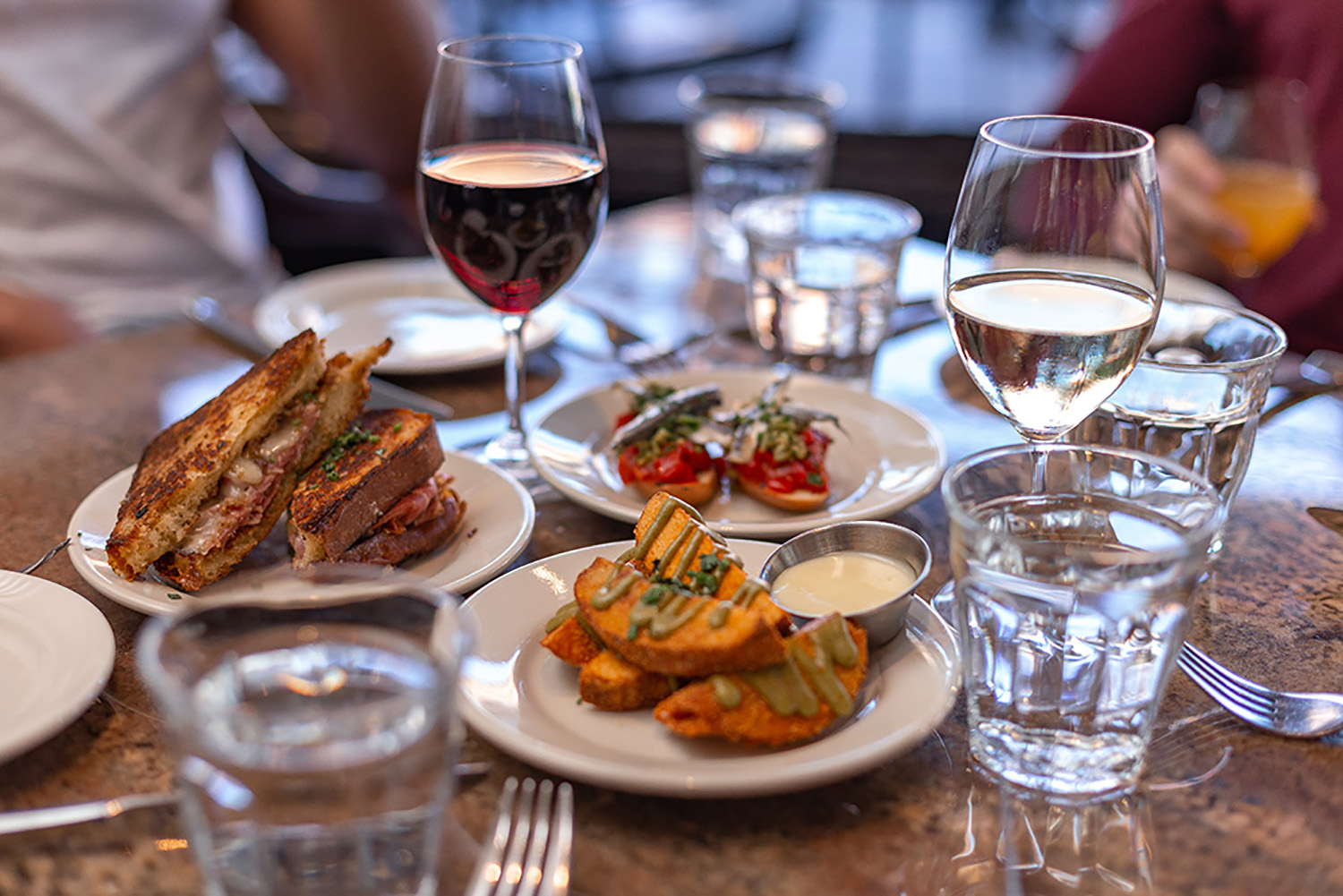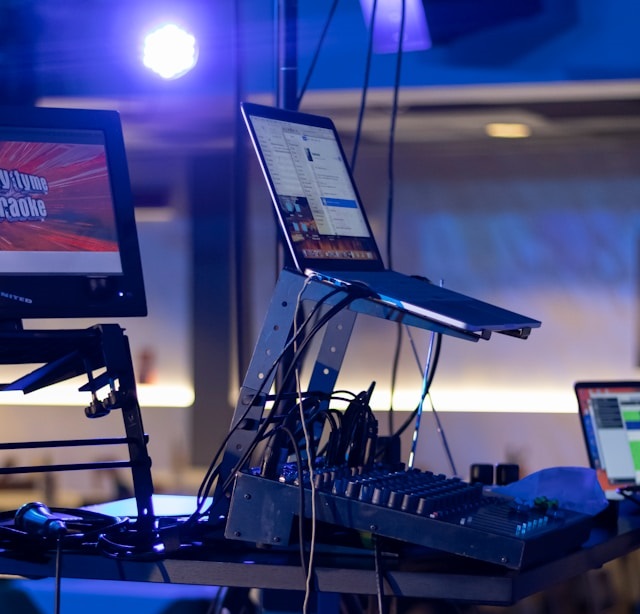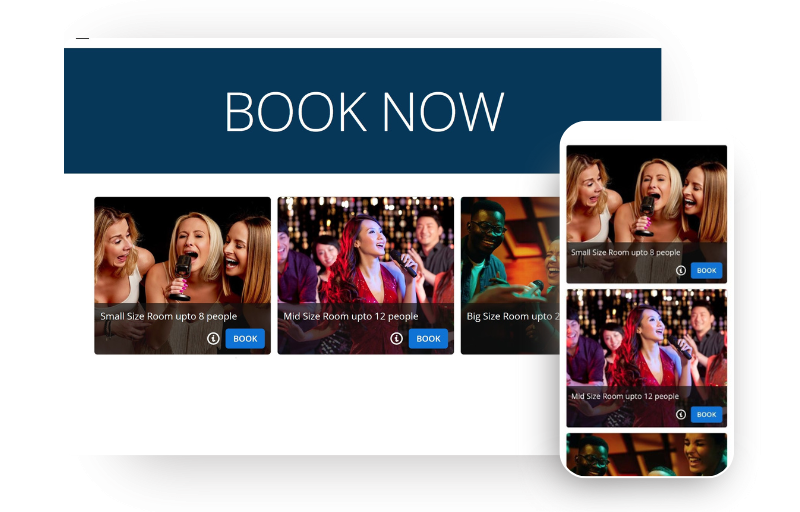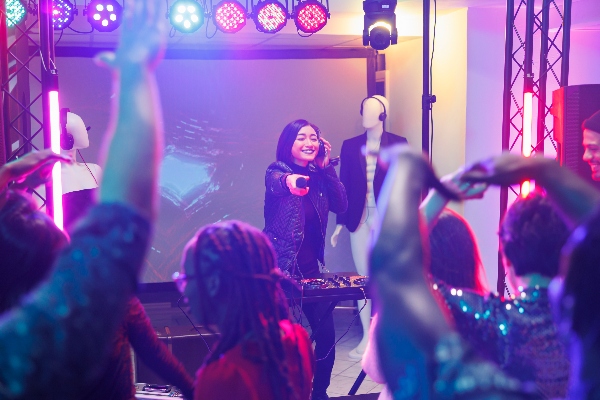
How to Open a Karaoke Business in Los Angeles: Your Ultimate Guide
Karaoke – it’s the activity where you can belt out your favorite hits, even if you sound more like a howling cat than a pop star. Los Angeles, with its lively nightlife scene, has a huge appetite for fun and unique experiences. Not to mention, the entertainment-hungry demographics of Los Angeles citizens also make it the perfect city for opening a karaoke bar.
Yet, despite the lucrative opportunity, launching a successful karaoke business in Los Angeles isn’t as easy as hitting a high note. You should expect stiff competition, licensing challenges, and the constant need to keep things fresh. Yet, don’t worry – this guide is here to help you navigate the entire process.

This article will be your roadmap to karaoke success, and we’ll cover:
- Figuring out your ideal customer
- Creating a standout karaoke concept
- Getting the right licenses and permits
- Designing an awesome space
- Marketing your karaoke bar to the right crowd
Ready to get started? Let’s dive into the first step – understanding your market and choosing the perfect concept for your karaoke bar.
1. Market Research and Concept Development
Think of this section as warming up your vocal cords before a big performance. Before you start spending money on equipment or a lease, you need a solid plan. We’ll start by digging into who you want to attract to your karaoke bar. Then, we’ll brainstorm concepts that will make people choose your spot over all the others in LA.
Understanding Your Target Audience
Picture this: it’s Friday night, the lights are low, and the energy’s high. Who do you see stepping up to that microphone? Before you start designing your karaoke haven, you need to understand who you’re designing it for.

Let’s break it down:
- Dig into the data: Look up the demographics of different LA neighborhoods. Are you thinking young and trendy? More established with families? This info will guide your choices.
- Hit the town: Where are the nightlife hotspots? Don’t just focus on existing karaoke joints – check out bars, clubs, and even restaurants that draw in your kind of crowd.
- Demand Check: Are there areas screaming for a karaoke spot that don’t have one? Or is the market already packed with competition?
This isn’t just about numbers and maps. It’s about imagining the vibe of your future karaoke bar. Do thorough research, but also trust your instinct.
Crafting Your Unique Concept
The karaoke market in LA is competitive and crowded.
To stand out amidst this saturated market, you need a unique concept that hooks your target audience in and makes them want to come back for more. Let’s explore some key elements:
- The Power of Themes: Think beyond just karaoke night. Could you rock a weekly 90s throwback or a monthly spotlight on a specific music genre? Themes build excitement and attract devoted fans.
- Stage or Private Rooms (or Both!): A lively stage creates a party atmosphere, while private rooms cater to smaller groups seeking intimacy. Could you offer a balance of both for maximum appeal?
- Beyond the Mic – Food & Drinks: Will your menu be simple snacks or full-fledged dining? Are you thinking craft cocktails or a focus on local beers? Your food and beverage offerings can become a major part of your concept.

- The Feel of the Place: Do you picture a sleek, modern lounge or the cozy charm of a classic dive bar? Your décor and atmosphere play a big role in setting the right mood for your karaoke concept.
Remember, success comes from focusing on a specific idea and doing it exceptionally well. Don’t be afraid to get creative.
The Perfect Name: Your Karaoke Calling Card
Your karaoke bar’s name is more than just a label. It’s the first impression you make on potential customers. A great name should be:
- Memorable: It needs to stick in people’s minds long after they hear it.
- Catchy: Easy to say and fun to share with friends.
- On-Brand: Does it match the vibe and concept you’ve chosen for your karaoke bar?
Brainstorming Tips
- Play with words: Think of puns, music references, or even local LA slang.
- Keep it short and sweet: Long names are hard to remember.
- Check availability: Make sure the name isn’t taken and that you can get a matching website address.
It’s important not to rush this step. The right name can become a huge part of your karaoke bar’s identity.
2. Business Plan and Financials
Think of your business plan as the sheet music for your karaoke venture. It’s your guide to turning a dream into a reality.

This section might not be the most glamorous, but it’s absolutely vital. We’ll get into the nitty-gritty numbers and planning that can make or break your business.
Essential Components of a Business Plan
Let’s break down the key pieces you’ll need to include in a business plan:
- Executive Summary: Think of this as your elevator pitch. A quick, attention-grabbing summary of your whole business idea and why it’s a winner.
- Market Analysis: You’ve done your homework on your target audience and competition, right? This section is where you show off that knowledge.
- Operations: How will your karaoke bar actually work? Outline everything from staffing needs to how you’ll handle song requests.
- Marketing: Time to get the word out! This section details your plan for attracting customers and building your brand.
- Financial Projections: This is where the numbers talk. Create realistic predictions of costs and income to show you have a handle on the money side of things.
Remember, a business plan isn’t meant to be set in stone. It’s a living document that you can adjust as your karaoke bar grows and evolves.
Estimating Startup Costs
Opening a karaoke bar isn’t cheap. Before you sign a lease or order that fancy karaoke system, you need a clear picture of how much money you’ll need to get started.

Here’s where your budget will likely take the biggest hits:
- Rent: Location matters! A prime spot in a trendy LA neighborhood will cost more than somewhere off the beaten path.
- Licensing: The fun of red tape – you’ll need various business permits and likely a liquor license if you plan to serve drinks.
- Equipment: The heart of your karaoke bar! Budget for a quality sound system, microphones, screens, and an extensive song library.
- Inventory: If you’re serving food and drinks, factor in the initial costs of stocking your bar and kitchen.
- Staffing: You’ll need bartenders, servers, a karaoke host, and potentially security personnel.
Don’t forget about those smaller expenses. They can add up! Think about things like marketing materials, décor, and even cleaning supplies. It’s better to overestimate costs than to be caught short.
Securing Funding Options
Unless you’ve got a spare fortune lying around, you’ll need to secure funding to get your karaoke bar off the ground. Let’s explore your options:
- Personal savings: Using personal savings to fund your business gives you the most control, but it is also the riskiest. Be realistic about how much you can afford to invest.

- Business Loans: Banks and other lenders offer loans specifically for starting businesses. Be prepared to show a solid business plan and good credit history.
- Finding Investors: Finding people who believe in your business and are willing to invest money in it (in exchange for equity and/or future profits). Networking is key.
Before making any commitments, carefully evaluate the terms and circumstances of each option. Ultimately, the “right choice” would depend on your unique financial situation and personal risk tolerance.
3. Location, Licenses, and Permits
Location, location, location! It’s a cliché for a reason. The right spot can make or break your karaoke bar. On top of that, navigating the world of licenses and permits is a must. While this section may not be the most exciting, this is still a crucial step that shouldn’t be neglected.
Finding Your Karaoke Location
Your karaoke bar needs a home that draws the right crowd.

Let’s look at the key factors to consider when scouting out the perfect spot:
- Visibility: Can people easily see your bar from the street? Signage is important, but location plays a big role.
- Foot Traffic: Is the area bustling with people, especially at the times you want to be open?
- Demographics: Does the neighborhood’s vibe match the crowd you want to attract?
- Accessibility: Is it easy to get to by public transport or car? Think about your customers after a few drinks!
- Parking: Limited parking can be a major turn-off, especially in LA. Consider nearby lots or street parking options.
- Zoning: The less fun stuff, but still important. Make sure the area is zoned for the kind of business you want to run (a karaoke bar with late hours might not fly everywhere).
Remember, it’s about finding the right balance between a good location and a price you can afford. Be prepared to scout out multiple spots before finding “the one.”
Necessary Licenses and Permits
Unfortunately, opening a karaoke bar isn’t only about having a good idea and business execution. You’ll need to navigate the bureaucratic side of things to make sure you’re operating legally.

Here’s a rundown of the common licenses and permits you’ll likely need:
- Business License: This is your basic permit to operate a business in Los Angeles.
- Liquor License: If you’re planning to serve alcohol, this one is essential. The process can be complicated, so start early!
- Food Service Permit: Will you be serving even simple snacks? You’ll need a permit from the health department.
- Public Performance Licenses: Playing music in public requires licenses from organizations like ASCAP, BMI, and SESAC. These cover the royalties you owe to songwriters and artists.
- Police Permits: Los Angeles often requires special permits for live entertainment or shows.
Important Considerations:
- Don’t skimp on this step: Operating without the proper licenses can lead to hefty fines or even closure of your karaoke bar.
- Regulations can change. Always double-check with the relevant LA government agencies to get the most up-to-date information.
- Consider a consultation: If the paperwork feels overwhelming, hiring a lawyer or consultant specializing in business licenses might save you headaches in the long run.
Navigating LA Business Regulations
Let’s simplify navigating the bureaucratic maze of LA business regulations. Here are key resources and links to streamline the process:
Your Online Guides
- City of Los Angeles Business Portal: (https://business.lacity.org/) A good starting point for general information about starting a business in Los Angeles.
- Los Angeles County Department of Public Health: (https://publichealth.lacounty.gov/eh) Essential if you’ll be serving food. Find information on permits, inspections, and regulations.
- California Department of Alcoholic Beverage Control (ABC): (https://www.abc.ca.gov/) Start here for everything related to liquor licenses – applications, rules, and resources.
- Performance Rights Organizations:
- ASCAP: https://www.ascap.com/
- BMI: https://www.bmi.com/
- SESAC: https://www.sesac.com/
Important Reminders
- Don’t rely solely on websites. It’s often helpful to call the relevant agencies directly to clarify specific questions about your karaoke bar plans.
- Deadlines matter! Many licenses and permits have strict application deadlines. Start the process early to avoid delays in opening your business.
4. Designing Your Karaoke Space
You’ve got the business plan figured out, now it’s time for the fun part! In this section, we’ll discuss how to turn your Karaoke business idea into reality. We’re talking about décor, stage design, lighting; all the elements that create an unforgettable karaoke experience.
Interior Design and Ambiance
Your karaoke bar’s interior design should be a perfect marriage of your chosen concept and the needs of your target audience. Here’s what to keep in mind:
- Concept Connection: Does your décor scream 80s nostalgia? Upscale elegance? Every design choice should reinforce the overall vibe you’ve chosen.
- Who’s Your Crowd? Young and social? Design spaces that encourage mingling and larger groups. Older crowd? Think comfort and a more elegant atmosphere.

- Lighting Matters: It sets the mood! Consider dimmable lighting for flexibility, stage spotlights, and even fun decorative elements that fit your theme.
- Seating Variety: Offer a mix! Barstools for casual drinks, cozy booths for groups, and a clear line of sight to the stage area if you have one.
- Soundproofing is Key: You want the karaoke magic contained inside your bar, not blasting out into the neighborhood. Invest in quality soundproofing, especially if you’re in a mixed-use area.
Practical Note: Don’t forget about the behind-the-scenes. You’ll need storage space for equipment, a well-designed bar area for staff (if serving drinks), and clean, accessible restrooms.
Private Karaoke Rooms (Optional)
Private karaoke rooms offer a more intimate experience, especially popular with smaller groups or those seeking a bit of privacy.

If you decide to include them, here’s what to consider:
- Demand Check: Are private karaoke rooms a big draw in LA? Research your competitors and gauge potential customer interest before making a big investment.
- Soundproofing is Crucial: Even more so than with your main space! You don’t want the sounds of one group’s off-key ballad bleeding into the room next door.
- Room Design: Each room is its own mini-stage. While still aligned with your overall concept, consider giving rooms slightly different personalities through décor and lighting.
- Sizing Matters: Plan for a variety of potential group sizes. Have a few cozy rooms for couples and larger spaces to accommodate parties.
Important Note: Private karaoke rooms often come with their own tech systems and song libraries. Factor this additional cost into your design plans.
5. Equipment and Technology
Let’s face it, you can have the coolest karaoke space in LA, but if the sound system is terrible, your customers won’t be coming back. This section is all about choosing the right equipment and technology to keep those karaoke hits sounding amazing.
Choosing Your Karaoke System
Your karaoke system is the backbone of your entire karaoke venture. Here’s a deeper look at the options and factors to consider:
System Options:
-
- Dedicated Karaoke Machines: Often all-in-one solutions with built-in music libraries, sometimes including discs. These can be user-friendly but may have limited song selection or flexibility.
- Computer-Based Software: Popular options include Karafun, PCDJ, and Siglos. These offer extensive customization but require you to source your own music tracks or subscribe to a streaming service.
- Subscription-Based Streaming: Services like Karaoke Cloud offer massive song libraries with constant updates. However, you’ll rely on a strong internet connection and monthly fees.
Software Features: Regardless of system type, look for:
-
- Intuitive song search: Customers need to easily find their favorites!
- Queue Management: Smooth transitions between singers are key.
- Key-Changing: Helps singers of all skill levels sound their best.
- Vocal Effects (Optional): Some software offers fun vocal effects for added entertainment.

Song Libraries:
-
- Size and Variety: Aim for a vast library across genres and eras to keep customers happy.
- Licensing: Be sure your chosen system uses properly licensed tracks. Using pirated music can lead to legal troubles.
- Updates: Choose a system with regular library updates to keep things fresh.
Pro Tip: Consider consulting with an audio-visual specialist to help tailor the right system and sound setup for your specific karaoke bar space.
Microphone, Speakers, and Sound Equipment
Let’s break down the microphone, speaker, and sound equipment essentials for your karaoke bar:
Main Stage Setup
- Microphones: Invest in a few high-quality, durable microphones. Consider a mix of wired (more reliable) and wireless (offer freedom of movement) options.

- Speakers: Powerful speakers are needed to project sound throughout the bar. Choose speakers designed for vocals and live music.
- Mixer: Allows you to control microphone levels, add effects (if desired), and mix your music source with the vocals.
- Monitor Speakers: Floor monitors pointed at the stage help singers hear themselves clearly, which is important for staying on pitch.
Private Rooms
- Microphones: At least two microphones per room. Again, a combination of wired and wireless is ideal.
- Speakers: Smaller rooms require less powerful speakers, but sound quality still matters.
- Simplified System: Consider all-in-one systems or user-friendly setups that your customers can operate themselves.
General Tips
- Soundproofing: Rooms (and your main stage area) should be soundproofed to avoid noise bleed between spaces.
- Cables and Stands: Don’t forget the essentials! Sturdy microphone stands, quality cables, and backups are important.
- Regular Maintenance: Clean microphones between singers, and schedule occasional check-ups of your sound system to prevent any performance-ruining technical issues.
Lighting and Visuals
Lighting and visuals aren’t just about making sure people can see. They play a huge role in setting the mood and adding excitement to your karaoke bar.
- Stage Spotlight: Even a small stage deserves proper lighting. Invest in basic spotlights to make your singers feel like stars. Colored lights can add a fun touch!
- Screens Matter: Clear, well-placed screens for displaying lyrics are essential. Consider additional screens around the bar to keep everyone engaged.
- Visual Flair (Optional): If it fits your concept, consider things like:
- Music Visualizers: Synced with the music for a dynamic effect
- Video Backdrops: Enhance specific song themes (think tropical beach for a summer hit)
- Disco Ball: Because sometimes, a classic is all you need!
Important Note: Lighting placement is key. Avoid harsh lights shining directly into your customers’ eyes, and ensure your singers are well-lit without creating blinding hotspots.
Streamline Your Karaoke Bookings
Ditch the overflowing notebook and endless phone calls! Online booking systems, like Bookeo, are designed to make handling reservations a breeze, especially for sought-after private karaoke rooms.

Here’s how they can transform your karaoke bar:
- Real-Time Availability: Customers can see exactly what rooms are available and when, reducing back-and-forth communication.
- Easy Reservations 24/7: People can book anytime, from anywhere – no need to be stuck answering calls during busy hours.
- Less Admin Headaches: Automated confirmations, reminders, and online payments reduce the time you spend on administrative tasks.

- Data & Insights: Some booking platforms offer analytics on customer trends and booking patterns, helping you optimize your room usage.
Bookeo Benefits: Bookeo is a popular booking software for karaoke bars thanks to its easy setup, customizable booking options, and integration with other tools like your website or social media.
6. Staffing and Operations
Building Your Karaoke Dream Team
Your staff is the heart of your karaoke bar! Here are the key roles you’ll likely need to fill:
- Bartenders: If you’re serving drinks, experienced bartenders who can handle a crowd are a must. Look for friendly personalities and a basic knowledge of popular drinks.
- Servers: They’ll keep the food and drinks flowing, playing a big role in customer experience. Ensure they can work efficiently in a potentially chaotic environment.
- Karaoke Hosts (KJs): The life of the party! Your KJ should be energetic, have basic music knowledge, and know how to work your karaoke system.
- Sound Technicians: Depending on your setup’s complexity, you might need dedicated sound techs to troubleshoot issues and ensure audio quality.
- Security (if needed): Larger bars, those with late hours, or those in busy areas might need security staff to maintain order and ensure customer safety.
Happy Staff = Happy Customers
A positive work environment is crucial for attracting and retaining good employees. Here’s how to create a supportive atmosphere:
- Clear Expectations: Develop job descriptions and training procedures to avoid confusion and ensure everyone’s on the same page.
- Foster a Fun Atmosphere: Karaoke is about letting loose! Encourage a sense of fun among your staff while maintaining professionalism.
- Appreciation Matters: Acknowledge hard work, whether through staff meals, small bonuses, or genuine praise.
Smooth Sailing with Operational Systems
Systems keep your karaoke bar running like a well-oiled machine. Develop clear procedures for:
- Song Requests: Will you use a digital system, paper slips, or something else? Ensure it’s organized and allows for some spontaneity.
- Drink & Food Orders: How will orders be taken and communicated to the bar and kitchen?
- Room Turnover: Have a plan for cleaning and resetting rooms between groups, especially on busy nights.
- Customer Service: Develop guidelines for handling everything from enthusiastic singers to potential customer complaints.
7. Creating a Memorable Karaoke Experience
Agreat song selection and sound system are important, but the true magic of karaoke comes from the atmosphere you create. Here’s how to make it special:
- Customer Service Superstars: Your staff sets the tone. Train them to be friendly, attentive, and genuinely excited about karaoke. A welcoming smile goes a long way!
- The KJ: Your Master of Ceremonies A good karaoke host (KJ) isn’t just about operating the machine. They’re entertainers who can warm up a crowd, hype up the singers, and keep the energy high.

- Everyone’s a Star: Encourage audience participation! Clapping along, cheering, and creating a supportive atmosphere makes even the most timid singers feel comfortable.
- Food & Drinks: The Perfect Complement Develop a menu that fits your concept. Whether it’s simple but tasty bar snacks or more elaborate food choices, offer good value and options to keep people fueled during their karaoke sessions.
Remember that inclusivity matters, and karaoke should be fun for everyone. Ensure your song library has options for singers of all skill levels and be ready to make adjustments like key changes to help people sound their best.
8. Managing Your Karaoke Library
A great karaoke library is the backbone of a successful karaoke bar. Here’s what to keep in mind:
Variety is Spice: Aim for a wide selection spanning genres, decades, and languages (if it fits your clientele). A mix of chart-toppers and niche favorites keeps everyone happy.
Subscription vs. Purchase:
-
- Subscription Services: Services like Karaoke Cloud offer massive libraries for a monthly fee. Pros: easy access to new releases, no storage worries. Cons: ongoing costs, reliance on internet connection.
- Purchasing Tracks: You buy individual tracks or discs. Pros: More ownership, potentially cheaper long-term. Cons: Upfront costs, requires storage and management
Staying Current: New hits are constantly released! Make sure your chosen system allows for regular updates to your library to keep the karaoke party fresh.
Important Considerations
- Licensing: Be sure the tracks you’re using are properly licensed for public performance. Using pirated music is illegal and can get you in serious hot water.
- Customer Requests: Have a system in place to take requests and potentially source new songs on demand. This adds extra value for your customers.
Dealing With Challenges and Potential Issues
Running any business comes with its hiccups. Karaoke bars have a few unique challenges to be aware of:
Noise Complaints: Let’s be real, karaoke can get loud!
-
- Location Matters: Choose a location that isn’t directly in a residential area.
- Soundproofing is Key: Invest in quality soundproofing within your bar.
- Be a Good Neighbor: Communicate with nearby businesses and residents. Set clear closing hours and address any problems promptly.
Managing Intoxicated Patrons:
-
- Responsible Service: Follow all local laws regarding alcohol service.
- Train Your Staff: Ensure they know how to spot signs of over-intoxication, cut people off tactfully, and handle difficult situations.
Technical Difficulties: Microphones die, systems crash… it happens.
-
- Backup Plan: Have backup mics, cables, and a basic understanding of troubleshooting your sound system.
- Know Your Limits: For major technical issues, have a trusted audio technician on call.
Staying Competitive: The LA nightlife scene is always changing.
-
- Never Stop Improving: Gather customer feedback, and stay updated on karaoke trends.
- Find Your Niche: What makes your karaoke bar special? Keep honing that unique concept.
Remember, facing challenges is normal. Proactive planning and a willingness to adapt are key to your karaoke bar’s long-term success.
11. Expanding Your Karaoke Business
You’ve built a successful karaoke bar, now what?

Here are ways to grow and reach new audiences:
- Karaoke Contests: Tap into the competitive spirit! Regular contests build community, attract regulars, and create a buzz around your bar.
- Partnering with Local Talent: Collaborate with local singers, bands, or musicians to offer unique experiences like live band karaoke nights. This draws in both music lovers and performers.
- Catering and Private Events: Your karaoke setup is perfect for more than just regular bar nights. Offer catering packages and private room rentals for birthday parties, corporate events, and other celebrations.
- Scaling Up (If It Fits Your Vision): Success with one location might spark the dream of expansion. Briefly outline the considerations involved in opening additional karaoke bars – finding the right locations, replicating your successful formula, etc.
Important Note: Growth should be strategic. Ensure these expansions align with your original concept and that you have the resources (both financial and staff-wise) to manage them successfully.
Conclusion
Opening a karaoke bar in Los Angeles is an adventure! It takes planning, hard work, and a whole lot of passion for music and fun. Let’s recap the key steps we’ve covered:
- Find Your Niche: What makes your karaoke bar stand out? Choose a unique concept and target audience.
- Location, Permits, the Nitty Gritty: Secure the perfect spot and navigate the maze of licenses.
- Design for the Experience: Create an atmosphere that matches your concept and excites your customers.
- Tech is Your Tool: Invest in the right equipment and systems to keep the music flowing.
- Staff Sets the Tone: Hire energetic people who love karaoke and create a positive work environment.
- Promote Your Passion: Spread the word through online presence, partnerships, and creative marketing.
- Customer is King: Stellar service, a welcoming atmosphere, and a diverse song library keep people coming back.
- Never Stop Growing: Evolve your song selection, host contests, and explore new ways to expand your karaoke empire.
Remember, building a successful karaoke bar takes dedication, attention to detail, and an unwavering belief in the power of music to bring people together.
If you’ve got the karaoke fire burning inside you, don’t let it go out! With careful planning and a sprinkle of LA magic, you can turn your karaoke dreams into a reality.

